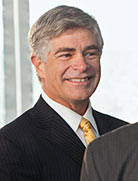

As you’ve probably noticed, most issues of UD Research explore the University’s work in key areas of discovery and innovation: health sciences, national security and defense, energy, environmental sustainability. While this issue doesn’t have an obvious focal area, it does have a theme of sorts. It’s a theme that threads through most of the research we undertake at UD: empowerment.
Gretchen Bauer researches the expanding role of women in African politics, and chronicles how women are newly claiming the right to become chiefs. Cole Galloway’s modification of off-the-shelf, ride-on toy cars enhances cognition and mobility in children with disabilities and improves their family dynamics. Interventions developed by Mary Dozier help foster children and children of international adoption develop secure, organized attachments to their caregivers and parents. Erica Armstrong Dunbar examines the life of Ona Judge, an enslaved servant of George and Martha Washington who escaped to freedom in 1796.
For all our technological daring (check out “O Internet Pioneers!” and “NanoWorld”), UD’s research is decidedly human. We’re in the business of using knowledge, invention and innovation to connect individuals with their own power — the power to effect change, to optimize our abilities and improve our interactions, to enlarge our imprint on the world and stake a claim to its enrichment.
In fall 2009, UD purchased the former Chrysler Newark Assembly Plant, 272 acres on which we’ll conduct the kind of research we’ve become known for — research that ultimately makes us healthier, stronger and safer, research that conserves our energy resources and preserves our environment. This spring, we named that acreage the Science, Technology and Advanced Research (STAR) Campus. This STAR, evocative of Chrysler’s classic Pentastar logo, is pointing us toward the future we’ve long envisioned, one in which UD’s pioneering research empowers us to transform ourselves, our families, our communities and our planet. And once we tap into our own extraordinary power, there’s nothing we can’t do.
Sincerely,
Patrick T. Harker
President, University of Delaware